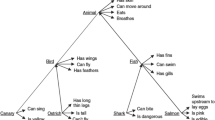Abstract
In four experiments, we examined the effects of repetitions and variability on the learning of bird families and metacognitive awareness of such effects. Of particular interest was the accuracy of, and bases for, predictions regarding classification of novel bird species, referred to as category learning judgments (CLJs). Participants studied birds in high repetitions and high variability conditions. These conditions differed in the number of presentations of each bird (repetitions) and the number of unique species from each family (variability). After study, participants made CLJs for each family and were then tested. Results from a classification test revealed repetition benefits for studied species and variability benefits for novel species. In contrast with performance, CLJs did not reflect the benefits of variability. Results showed that CLJs were susceptible to accessibility-based metacognitive illusions produced by additional repetitions of studied items.







Similar content being viewed by others
References
Benjamin, A. S., Bjork, R. A., & Schwartz, B. L. (1998). The mismeasure of memory: When retrieval fluency is misleading as a metamnemonic index. Journal of Experimental Psychology. General, 127, 55–68.
Crowder, R. G. (1976). Principles of learning and memory. Hillsdale, NJ: Erlbaum.
Dukes, W. F., & Bevan, W. (1967). Stimulus variation and repetition in the acquisition of naming responses. Journal of Experimental Psychology, 74, 178–181.
Dunlosky, J., & Hertzog, C. (2000). Updating knowledge about strategy effectiveness: A componential analysis of learning about strategy effectiveness from task experience. Psychology and Aging, 15, 462–474.
Dunlosky, J., & Metcalfe, J. (2009). Metacognition. Thousand Oaks, CA: Sage.
Hahn, U., Bailey, T. M., & Elvin, L. B. (2005). Effects of category diversity on learning, memory, and generalization. Memory and Cognition, 33, 289–302.
Homa, D., Cross, J., Cornell, D., Goldman, D., & Shwartz, S. (1973). Prototype abstraction and classification of new instances as a function of number of instances defining the prototype. Journal of Experimental Psychology, 101, 116–122.
Homa, D., Sterling, S., & Trepel, L. (1981). Limitations of exemplar-based generalization and the abstraction of categorical information. Journal of Experimental Psychology: Human Learning and Memory, 7, 418–439.
Jacoby, L. L., Wahlheim, C. N., & Coane, J. H. (2010). Test-enhanced learning of natural concepts: Effects on recognition memory, classification, and metacognition. Journal of Experimental Psychology: Learning, Memory, and Cognition, 36, 1441–1451.
Kelley, C. M., & Jacoby, L. L. (1996). Adult egocentrism: Subjective experience versus analytic bases for judgment. Journal of Memory and Language, 35, 157–175.
Koriat, A., Bjork, R. A., Sheffer, L., & Bar, S. K. (2004). Predicting one’s own forgetting: The role of experience-based and theory-based processes. Journal of Experimental Psychology: General, 133, 643–656.
Kornell, N., & Bjork, R. A. (2008). Learning concepts and categories: Is spacing the “enemy of induction”? Psychological Science, 19, 585–592.
Murphy, G. L. (2002). The big book of concepts. Cambridge, MA: MIT Press.
Posner, M. I., & Keele, S. W. (1968). On the genesis of abstract ideas. Journal of Experimental Psychology, 77, 353–363.
Rhodes, M., Gelman, S. A., & Brickman, D. (2008). Developmental changes in the consideration of sample diversity in inductive reasoning. Journal of Cognition and Development, 9, 112–143.
Rips, L. (1989). Similarity, typicality, and categorization. In S. Vosniadou & A. Ortony (Eds.), Similarity and analogical reasoning (pp. 21–59). Cambridge, England: Cambridge University Press.
Rips, L., & Collins, A. (1993). Categories and resemblance. Journal of Experimental Psychology: General, 122, 468–486.
Shah, A. K., & Oppenheimer, D. M. (2011). Grouping information for judgments. Journal of Experimental Psychology: General, 140, 1–13.
Shiffrin, R. M., Huber, D. E., & Marinelli, K. (1995). Effects of category length and strength on familiarity in recognition. Journal of Experimental Psychology: Learning, Memory, and Cognition, 21, 267–287.
Stewart, N., & Chater, N. (2002). The effect of category variability in perceptual categorization. Journal of Experimental Psychology: Learning, Memory, and Cognition, 28, 893–907.
Wahlheim, C. N., Dunlosky, J., & Jacoby, L. L. (2011). Spacing enhances the learning of natural concepts: An investigation of mechanisms, metacognition, and aging. Memory and Cognition, 39, 750–763.
Wahlheim, C. N., Teune, R. K., & Jacoby, L. L. (2011). Birds as natural concepts: A set of pictures from the Passeriformes order. Retrieved from http://psych.wustl.edu/amcclab/AMCC%20Materials.htm
Author note
The present research was supported by National Institute on Aging Grant 5T32AG000030 and by a James S. McDonnell Foundation 21st Century Science Initiative in Bridging Brain, Mind, and Behavior Collaborative Award. We thank Rachel Teune for her assistance with manuscript preparation and data collection. We also thank Sarah Arnspiger, Ashley Bartels, Lauren Guenther, Synneva Hagen-Lillevik, Dan Howard, and Ashim Lamichhane for their assistance with data collection.
Correspondence concerning this article should be addressed to C. N. Wahlheim, Department of Psychology, Washington University, One Brookings Drive, St. Louis, MO 63130 (e-mail: wahlheim@artsci.wustl.edu).
Author information
Authors and Affiliations
Corresponding author
Rights and permissions
About this article
Cite this article
Wahlheim, C.N., Finn, B. & Jacoby, L.L. Metacognitive judgments of repetition and variability effects in natural concept learning: evidence for variability neglect. Mem Cogn 40, 703–716 (2012). https://doi.org/10.3758/s13421-011-0180-2
Published:
Issue Date:
DOI: https://doi.org/10.3758/s13421-011-0180-2



